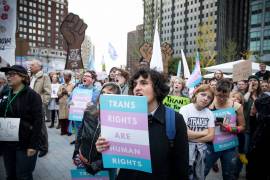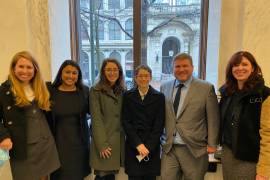
From Sex to Marriage: How Lawrence v. Texas Set the Stage for the Cases Against DOMA and Prop 8
Blog Search
In the blog series From Sex to Marriage: How We Got From Lawrence v. Texas to the Cases Against DOMA and Prop 8, we ask key players in Lambda Legal’s biggest victory to discuss the importance of the landmark case, and its impact on the marriage cases currently before the Supreme Court.
At the end of this month, the U.S. Supreme Court will hear oral argument in two cases that bear upon the rights of same-sex couples to marry and to have their marriages recognized by the federal government. It is fitting that these arguments will take place as we celebrate the 10th anniversary of Lawrence v. Texas, the path-breaking Supreme Court decision that declared laws criminalizing oral and anal sex between consenting adults to be unconstitutional and flung open the doors to equality for LGBT people around the nation. It is fitting because Lawrence, litigated in front of the Supreme Court in 2003 by Lambda Legal and our co-counsel Jenner & Block, has been a crucial part of the DNA of almost every legal victory for LGBT individuals over the past decade, and laid the foundation for the lower court rulings and the legal briefs in the two marriage cases—Hollingsworth v. Perry and U.S. v. Windsor—currently before the Court.
It is hard to overstate the critical importance of Lawrence in bringing the fight for full equality for LGBT individuals and their families to the point we celebrate today. Before Lawrence, not only were same-sex couples not allowed to marry, their very ability to forge personal relationships and engage in private consensual sexual conduct was criminalized. The ability of lesbian, gay and bisexual Americans to live openly was severely compromised by a devastating precedent: Bowers v. Hardwick, a 1986 Supreme Court ruling that permitted existing state anti-sodomy statutes to stand. In Lawrence, the Supreme Court issued a ringing declaration that Bowers “was wrong when it was decided—in the process sweeping away doctrinal as well as symbolic barriers to recognizing that unequal treatment based on sexual orientation is discrimination that cannot be tolerated in a just society.
Lawrence and its reasoning have been essential in landmark cases spanning the nation affirming the right of same-sex couples to marry, beginning with Massachusetts’s high court ruling in Goodridge v. Department of Public Health just months after Lawrence, to the Connecticut Supreme Court’s 2008 Kerrigan v. State of Connecticut decision, to Lambda Legal’s 2010 victory at the Iowa Supreme Court in Varnum v. Brien, to the Ninth Circuit ruling in Perry v. Brown (now known as Hollingsworth v. Perry), the challenge to Prop 8 that is now before the Supreme Court.
Lawrence was critical to court decisions holding that “Don’t Ask, Don’t Tell” violated the rights of lesbian, gay and bisexual military service members, hastening repeal of that discriminatory law. The U.S. Supreme Court itself also used Lawrence as a building block in its 2010 ruling in Christian Legal Society v. Martinez, upholding a public law school’s refusal to fund a student group that would not admit members who engaged in same-sex conduct, and rejecting the contention that discrimination against those who have same-sex partners is not discrimination against lesbian, gay and bisexual people.
Lawrence has also been a cornerstone of decisions declaring the federal so-called Defense of Marriage Act unconstitutional, including Lambda Legal’s victory in a California federal district court in Golinski v. Office of Personnel Management, and in U.S. v. Windsor, the DOMA challenge from the Second Circuit now pending before the Supreme Court.
These and many other courts have mined the rich constitutional meaning of Lawrence to render decisions with far-reaching impact. Thus, cases like Golinski have applied Lawrence faithfully in concluding that government discrimination against lesbian and gay individuals is so likely derived from prejudice that it must be subjected to heightened judicial scrutiny. Courts too have followed Lawrence’s reasoning to the inexorable conclusion that LGBT people have protected fundamental rights to marry and parent children, no different from other Americans. And many courts have recognized the moral disapproval at the heart of discrimination against LGBT individuals and concluded that such discrimination cannot withstand any level of judicial scrutiny.
Over the past decade, Lawrence has been cited by courts nearly 700 times and has been discussed in almost 5,000 law review articles. But, even beyond its direct legal effects, Lawrence helped shift the formerly widespread public perception of LGBT people as criminals to instead recognizing us as individuals engaged in intimate, caring relationships (or wanting to be). It led to a new generation growing up no longer forced to think of themselves as lawbreakers, but instead able to feel proud of being a part of the polity whom our Constitution protects. In addition, winning Lawrence meant that our community’s legal and political resources were freed up from trying to dismantle the nation’s remaining sodomy laws and could instead be redirected to fighting for workplace fairness, fair parenting laws, students’ rights, transgender rights, health care fairness, and, of course, protections for those in same-sex relationships. Without our victory in Lawrence, there is no doubt that our community would not be at the Supreme Court today, poised to win marriage rights as well.
Previously:
- Lambda Legal Executive Director Kevin M. Cathcart introduces the series and the guest bloggers.
- Attorney Mitchell Katine recalls receiving the phone call that set the Lawrence case in motion.
- Ruth Harlow, former Legal Director for Lambda Legal, discusses our legal strategy on Lawrence.
- Roger Poindexter, Regional Director at Lambda Legal’s Dallas office, reflects on what it was like living in Texas before and after the historic decision.
- Hector Vargas, former Regional Director at Lambda Legal’s Atlanta office, discusses our community education strategy in the South regarding sodomy laws.
- Former Lambda Legal board member Paul M. Smith shares his experience arguing Lawrence before the Supreme Court.
- Lambda Legal’s Director of Constitutional Litigation, Susan Sommer, discusses the ways in which Lawrence opened the door to legal victories in the fight against “Don’t Ask, Don’t Tell” and marriage equality cases in state courts.




